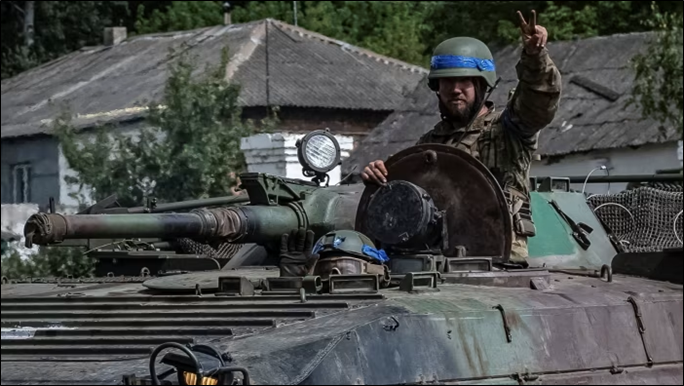Academy SITREP – Ukraine Continues its Cross-Border Assault into Russia

What has Happened:
- Last week, Ukraine launched a major ground assault with troops, tanks, and Stryker armored fighting vehicles into Russia, in what is the largest incursion into the country since the invasion of Ukraine began in February 2022.
- Military analysts said the attack could be an attempt to divert Russian units from the front lines, thereby relieving some pressure on Ukrainian troops struggling to contain advancing Russian forces.
- President Putin has met with his country’s security services to coordinate a military response to the attacks and called the Ukrainian incursion a “large-scale provocation.”
- Ukrainian forces have captured over 300 square miles of Russian territory and taken dozens of Russian prisoners, while Russian authorities have evacuated more than 100,000 people from villages and towns in Kursk.
- Zelensky finally acknowledged the attack on Saturday arguing that Russia had launched 2,000 attacks from Kursk this summer and it deserved a response.
- News of a successful attack might help boost the morale of the Ukrainian people and its armed forces.
- It was also reported that the Ukrainian military had established control over a gas transit station near the border, though any impact there could be minimal (both parties agreed to keep gas flowing) and gas exports from Russia into Europe fell from 45% in 2021, to 15% of all gas imports in 2023.
Why it Matters:
“Ukraine’s attack strengthens Zelensky’s leverage in any future ceasefire negotiations and discredits Putin by showing the world that the war is not going according to his propaganda. An additional effect could be to divert Russian troops away from the eastern Donbas front that is stressing Ukraine’s defensive forces. It also hurts Putin domestically with a state of emergency declared and Russian residents being evacuated. Zelensky has sought to demonstrate (with his newly acquired long-range weapons) that he can hit the Russian homeland just like the Russian military has hit Ukraine since the beginning of the war. The ongoing ground attack is another step in this direction. The real question now is whether this was a brilliant operational move or a big mistake that the Russian military will punish the Ukrainians for attempting. So far, that has not happened in over a week.” – General Robert Walsh
“Good initiative by Ukrainian forces. Expanding a tactical advantage into an ‘operational-like’ maneuver. I don’t know the objectives; this could be a raid (create havoc, break things, and return to Ukraine), or a demonstration (achieve specific tactical objectives and hold). Ukrainians will be able to disrupt Russian supply efforts causing Russians to alter/divert supplies increasing their exposure and decreasing the efficacy of tactical movements. Russians have had little success in their efforts to seize Kharkiv. This will cause Russian leadership to rethink their objective to anchor their ‘buffer zone’ in Kharkiv. Ukrainians must realize that tactically they are at greater risk of being cut off if Russian forces demonstrate the ability to attack into the Ukrainian flank. Strategically, Putin can paint Russia as the victim of Ukrainian aggression and NATO’s endorsement (if not outright encouragement) of the operation.” – General Spider Marks
“Ukraine’s invasion will offer Putin an opportunity to strengthen his support on the home front. He will position this event to his population as a ‘3rd European invasion,’ and that neither the U.S. nor NATO did anything to impede it. This will also likely complicate the U.S. and European front as it offers (though disingenuously) Russia leverage to try to push the U.S. and NATO/EU to drop its support for Ukraine (i.e. they are on their own). It could well enhance the Biden/Harris administration’s reluctance to support Ukraine with what it takes to be successful. It could also offer a Trump administration the chance to say that it is now too dangerous to continue to support Ukraine (remember NATO still does not see Ukraine as near-term NATO material, just long-term after corruption and good governance issues are addressed).” – General Mastin Robeson
“Ukraine should only enter into negotiations from a position of strength. This incursion helps, but it has to be examined in terms of what is next. Is this a sustainable effort or simply a demonstration that Russia is vulnerable as for the first time since WWII, a foreign military has invaded sovereign Russian territory. I’d be watching the shift of Russian forces to see if they can quickly reverse the Ukrainian incursion. Russia will also respond asymmetrically against civilian targets as part of a punitive strategy against Ukraine for the incursion.” – General Robert Ashley
“The Ukrainian objectives likely include: (1) Demonstrate Ukraine’s ability to operate beyond the border and take limited actions in Russia. (2) Demonstrate the inability of the Russians to respond to a rapid and mobile battle (especially in Ukrainian and Russian media outlets). (3) Force the Russians to pull together a military force to contain this breach, degrading their operations elsewhere. (4) Show Russians and the world the near-complete inability of the Russian Army to do anything beyond pushing ‘mass against lead.’ (5) Embarrass Putin and bolster NATO confidence. The Ukrainian assault will likely culminate relatively quickly (it will be inherently challenged for fuel, ammo, and drones to continue the piece-by-piece destruction of the Russian Army).” – General Michael Groen


